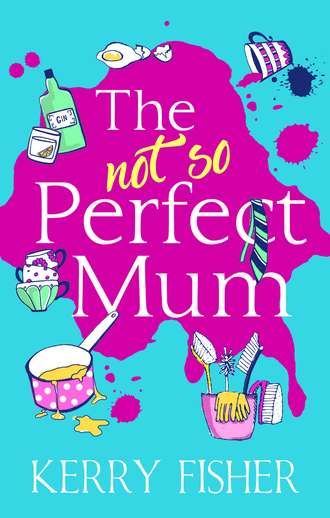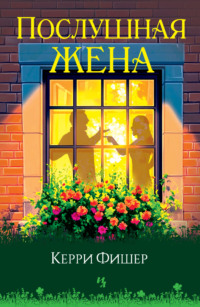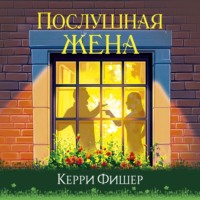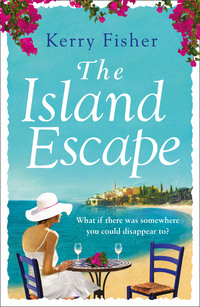
Полная версия
The Not So Perfect Mum: The feel-good novel you have to read this year!

KERRY FISHER
The Not So Perfect Mum

Copyright
HarperCollinsPublishers
1 London Bridge Street
London SE1 9GF
www.harpercollins.co.uk
First published in Great Britain by HarperCollins Publishers in 2014
This ebook edition published by HarperCollins Publishers in 2017
Copyright © Kerry Fisher 2014
Kerry Fisher asserts the moral right to be identified as the author of this work.
A catalogue copy of this book is available from the British Library.
This novel is entirely a work of fiction. The names, characters and incidents portrayed in it are the work of the author’s imagination. Any resemblance to actual persons, living or dead, events or localities is entirely coincidental.
All rights reserved under International and Pan-American Copyright Conventions. By payment of the required fees, you have been granted the non-exclusive, non-transferable right to access and read the text of this e-book on screen. No part of this text may be reproduced, transmitted, down-loaded, decompiled, reverse engineered, or stored in or introduced into any information storage and retrieval system, in any form or by any means, whether electronic or mechanical, now known or hereinafter invented, without the express written permission of HarperCollins.
Source ISBN: 9780007570232
Ebook Edition © July 2014 ISBN: 9780007570249
Version: 2018-05-10
Dedication
To Steve, Cameron and Michaela
Contents
Cover
Title Page
Copyright
Dedication
Chapter One
Chapter Two
Chapter Three
Chapter Four
Chapter Five
Chapter Six
Chapter Seven
Chapter Eight
Chapter Nine
Chapter Ten
Chapter Eleven
Chapter Twelve
Chapter Thirteen
Chapter Fourteen
Chapter Fifteen
Chapter Sixteen
Chapter Seventeen
Chapter Eighteen
Chapter Nineteen
Chapter Twenty
Chapter Twenty-One
Chapter Twenty-Two
Chapter Twenty-Three
Chapter Twenty-Four
Chapter Twenty-Five
Chapter Twenty-Six
Chapter Twenty-Seven
Chapter Twenty-Eight
Chapter Twenty-Nine
Chapter Thirty
Chapter Thirty-One
Chapter Thirty-Two
Chapter Thirty-Three
Chapter Thirty-Four
Chapter Thirty-Five
Chapter Thirty-Six
Chapter Thirty-Seven
Chapter Thirty-Eight
Acknowledgements
Keep Reading …
About the Author
About the Publisher
CHAPTER ONE
Posh women with dirty houses sometimes phone me. Posh men never do.
Until today, when this solicitor bod burst into my morning with the sort of booming confidence it would be impossible to argue against. My ears closed down, rejecting the steamroller voice, pushing away his words.
‘I’m sorry to be the bearer of ghastly news.’
I’d just got home from what was always my worst job of the week – cleaning the changing rooms at Surrey’s grottiest leisure centre. The phone rang shortly after I’d gone upstairs for a bath to scrub every trace of old plasters and plughole cack off my skin. As I clumped down to the kitchen wrapped in a towel that barely covered my backside, I was praying that the call was from Colin, with good news about work. Instead I stood there, holding the phone away from my ear so I didn’t drip water into the receiver while Mr William Lah-di-dah bellowed away at a slight distance, a sort of old Etonian-cum-Clanger. Then I heard it.
‘I’m afraid Professor Rose Stainton passed away last Friday.’
I pressed the phone into my forehead as I tried to take in the fact that my favourite – and best paying – customer had died. My oddball ally, with her outrageous old lady comments and bursts of unexpected kindness, had gone. I hadn’t even said goodbye. Froths of shampoo seeped out from under my towel turban and mingled with the sting in my eyes.
‘Mrs Etxeleku? Are you still there?’
‘Yes, I’m still here.’ I couldn’t be bothered to correct him. I’m not a Mrs. I’d given up waiting for Colin to pop the question. And my surname is pronounced Ech-eleku, not Et-zeleku. If only my father had hung around long enough for me to be born, I could have had a nice English name – Windsor, Jones, even Sidebottom – on my birth certificate, rather than the blank that made my mother clamp her mouth shut like a Venus flytrap every time I tried to discuss it. Instead I’ve spent thirty-six years lumbered with a Basque surname no one can pronounce.
‘How did she die?’ I heard a wobble in my voice. I leant against the wall, the chilly December draught blowing under the back door, licking around my wet knees.
‘A heart attack.’
‘Was she on her own?’
‘Yes, she managed to call an ambulance but she was dead by the time they reached her.’
He sounded as though he was discussing an order for a Chinese takeaway. I was obviously just a number on his neatly typed list of people to phone – a nobody, someone he needed to tell they no longer had a job. He paused. I imagined him sitting behind a heavy wooden desk, glancing down the page to see who came after ‘cleaner’. The idea that someone who spent her life wiping globs of toothpaste off sinks could be friends with someone who spent hers debating Kafka wouldn’t have crossed his mind. I started clattering about, throwing dirty cereal bowls into the sink and hurling trainers and football boots into a heap by the back door. I had no claim on Rose Stainton. I was just the woman with the mop, the skivvy who washed out the kitchen bin.
‘Anyway, part of the reason I’m calling is that her solicitor would like to see you,’ he said.
‘Solicitor? Is something missing?’ I said, panicking. Surely they weren’t trying to track down the parrot head bookends that the old lady had given me. I didn’t even like them. In my experience, solicitors weren’t people who wanted to see you. They were people who were instructed to see you. Middle-aged men in too tight shirts, who turned up at police stations to work on the pathetic little stories of drug addicts, drunkards and the bog standard low life that hung around our estate. The sort of men who’d saved Colin’s sorry little arse on more than one occasion.
‘No, Mrs Etxeleku. No, of course not, nothing like that. I believe there was something in the professor’s will that Mr Harrison would like to discuss with you.’
It was only after I’d put the phone down that the numbness started to fall away. My teeth were chattering. I pulled on the tracksuit bottoms Colin had left on a chair and grabbed my long cardigan, still damp, from the clothes airer. In films you see people burst into tears, sobbing, ‘I can’t believe she’s gone.’ But I started yelling. ‘Ghastly. Bad. Atrocious. Horrendous. Horrible. Hateful. Crap.’ That was one of the professor’s little games, getting me to think of different words to mean the same thing. When I got to ‘crap’, I banged on the window at the mad git next door who was flicking his terrier’s turds through the broken fence again. He appeared to be aiming for our paddling pool, left out since the summer, which had now become a slimy green home to water boatmen and other wildlife. He waved his shovel at me and smiled like a loon.
The professor had always talked to me like my opinions counted. She knew about Shakespeare, Dickens and foreign writers I’d never heard of before. She really liked Gabriel García Márquez and kept asking me to pronounce Spanish words for her. It embarrassed me because most of the time Mum and I had spoken English together, or at least my mother’s peculiar version of it. I wish she’d spoken more Spanish or even Basque to me, but 1970s Sandbury wasn’t a place to be foreign. It was an English market town, where a wool shop, a cobbler’s and a stamp collector’s shop were among the high street’s thrilling diversions. Mum saw England as the land of opportunity. She might sound like she’d missed her vocation as Manuel’s wife in Fawlty Towers but she was going to make damned sure that her daughter didn’t sound like a ‘second-class immigrant’.
I gave up trying to sort out my shithole of a kitchen and plonked down into a chair. I shoved aside Colin’s dirty plate to find the Open University application form that had arrived that morning. I had been intending to tell the prof this week that I was definitely going to enrol. I’d looked forward to seeing her formal manner give way to that excitable hand waving thing she did, which often ended up with her knocking over her little china teacup on the tray. She used to crack me up when she swore. Sometimes she’d say, ‘bugger me’ or ‘bloody hell’, but she never sounded like Colin when he’d been on the Guinness. More like she was just experimenting, seeing how swear words sounded. I loved the way she spoke, all those words perfectly formed, all the letters where they should be. She never used language to make me feel stupid.
I tore the application form up into tiny little pieces, like a dud lottery ticket. There was no way I could afford it now. I watched the paper float down onto the cork floor, noticing again that no matter how often I washed it, something was always gooing up the cracks between the tiles. I couldn’t even clean properly. I must have been getting ideas well above my station to think I could do a degree. I just thought that if the kids saw me bettering myself, they might aim a bit higher themselves. At Morlands Juniors, where teachers legged it after two terms and crowd control took priority over teaching, people to look up to were a bit thin on the ground.
There was no point snivelling about things I couldn’t change. I wasn’t going to think about how frightened the professor would have been when she realised that frail old heart of hers was finally giving out. Or how alone, in that huge house. I hoped she had died in the library with all her books soothing her to sleep. I started pouring bleach on the coffee-stained Formica worktops, trying to get away from the image of her slumped forwards over the creased brown leather of her winged armchair, grey hair escaping from her hairpins, tea – always Earl Grey – cooling beside her. The bleach stung my chapped skin. I made a silent promise to the prof that I’d never drop a ‘t’ again and said, ‘little, computer, water, butter’ out loud.
The front door banged open. Colin stomped down the hallway and into the kitchen, trailing mud right across the floor. I didn’t say anything. In fact, I deliberately looked away. He was always as touchy as hell when he got back from the Job Centre. There were so few plates left, we’d be eating straight off the table soon.
‘Jesus, that place is a dump. You’ve got more chance of catching bleeding TB than you have of getting a job there. All them silly questions. What letters have you written this week? Have you been to any interviews? Like you get a fucking interview to paint someone’s hallway.’
‘Did she say you could still get the money, though?’ I said, then held my breath.
‘Yeah, they’re going to “review” it in a month. S’pose seventy quid a week is better than nothing – least it gets us through Christmas,’ he said, ripping open a packet of biscuits.
Even though there’d been a drop in unemployment, Colin carried on tutting away, sucking air through his teeth, convinced that the painting and decorating trades would suffer for much longer. ‘Getting your bathroom painted ain’t a priority, is it? No, you mark my words, there ain’t gonna be business for me for a long while yet.’
Just to be sure that he wouldn’t bump into a job offer, he slumped onto a kitchen chair and dedicated himself to eating custard creams like a hamster stockpiling for famine. Unlike me, he was tall so he could get away with it for a while, but the six-pack of manual labour was slowly disappearing into an avalanche of blancmange.
I wanted to tell him about Rose. Just for a moment I wanted to rely on him. I wanted to put my head on his shoulder, have him stroke my hair and cry great big shuddery old sobs until my eyes were like golf balls. I tried to remember if, in nearly nineteen years, I’d ever relied on him. I had to tell him that we had even less cash now. It wasn’t like I was expecting him to make up the shortfall. Even if he could, I wouldn’t have been able to spend it on the Open University degree. Colin thought education was a waste of TV watching time. Why reach for the sky when you could just tune into it?
I counted to three. ‘Rose Stainton died on Friday.’
‘What, that posh old cow at the manor? Jesus, Maia, what we going to do for money now? Her timing stinks. She’s been ill for years and has to pick right now to snuff it. Will they pay you to clean up the old girl’s stuff at least? You’d better get yourself out there and start looking for another job.’
He scraped his chair back and started rummaging in the cupboard like his life depended on finding a tin of ravioli. I tried hard to remember the reason he’d held such a fascination for me. Why I’d loved him enough to have two children with him. Maybe his rebellious streak seemed romantic to me then, the naughtiness that had me skipping school and tearing off to Brighton for the day to eat fish and chips at the beach, shivering under the bandstand, sharing my scarf for warmth. He’d seemed so glamorous and grown-up to me, a twenty-one-year-old with a motorbike and strawberry blond charm. To my teachers’ horror, I dumped my A-levels and any notion of university, then hopped, skipped and stamped on my mother’s dreams and set off on a career on the tills at Tesco. A promotion to head of the deli serving up Scotch eggs followed. I then climbed to the dizzying heights of deputy fish fryer at the chippy and had now reached my peak as a cleaner to those who would rather die than say ‘toilet’ instead of ‘lavatory’ but still managed to piss on the floor.
Now, finally, I had grown up. In that moment, I wanted to rant about responsibility, smash his skull open with the wooden chopping board and cackle wildly. Instead, I made him a cup of tea and talked to him in the voice I used for Harley and Bronte when they were little and didn’t want to go to bed.
‘I’ll put a notice in the post office window. Did you phone that bloke from the builder’s yard who thought they might be looking for someone to help out painting the school?’
‘Bloody marvellous. You lose your job and straightaway you’re on at me. Get it into your thick head, Maia, there’s still a credit crunch, you know. People aren’t paying out to have their spare rooms decorated.’
‘I know, but this is a school, I just thought—’
Mercury FM came blaring on, blocking out what I just thought.
CHAPTER TWO
The prof’s death brought out the worrier in me. Unlike loads of people round our way who only seemed to remember they had kids when they turned up on the front doorstep next to a man in blue, I liked to know where mine were and what they were up to. Colin didn’t like me ‘bloody mollycoddling’ them by meeting them out of school, but that day I was desperate to shake off the dead by hugging the living. I wanted to suck in their just out of school smell, the clammy scent that clung to their clothes, somewhere between lunchtime chicken nuggets, stuffy classrooms and the pong of other people’s kids. They liked the prof and had often played in her huge garden while I worked. I wanted to tell them she’d died without Colin making snidey comments in the background.
I stood in the playground on the faded hopscotch squares, craning my neck. Bronte was often out first, walking through the pushing and shoving with what Colin and I secretly laughed about as her ‘piece of shit’ face, or POS for short. Today was no exception. While girls around her came blundering out with rucksacks half open, socks around their ankles and scarves hanging off, Bronte threaded her way through with the poise of a ballerina, her dark curly hair still clipped off her face, her coat zipped up, not even glancing at the bunfight going on around her. She had more togetherness in her nine-year-old little finger than I had managed in three decades. She smiled when she saw me, but enthusiasm wasn’t really part of her make-up.
‘Mum! What are you doing here?’ she said in a tone that could offend a thin-skinned person.
‘I had to go to the post office, so I thought I’d walk home with you. I had some bad news today so I felt like getting some fresh air.’
Bronte eyed me warily. I could see her closing down, ready to reject any neediness on my part. ‘What?’
‘You remember Rose Stainton, the professor of English, at the big white house? She died last week.’
Bronte looked down at the ground. ‘I liked her. She was nice.’ I waited for her to ask me something, anything. I suppose I’d thought she might cry. But she’d folded in on herself, shutting me out.
I broke the silence. ‘Do you want a hand with your bag?’ I ached to pull her into a big hug but resisted. No one did ironing board as well as Bronte.
‘Okay,’ she said, with a small shrug of one shoulder. She swung her bag towards me. ‘Are we waiting for Harley?’
She’d barely finished the question when he came bowling out of school, parka tucked under his arm, white polo shirt nearly as grey as his trousers. With a ten-year-old’s lack of understanding of weight, speed and energy, he charged into me. I staggered backwards into the straggle-haired woman next to me whose ‘Watch where yer going’ did nothing to put him off. He threw himself round me, unselfconscious, grey eyes shining up at me. I allowed my face to fall down onto his head, breathing him in and threading my freezing fingers into that warm space where his hair curled down over his collar. His shoulders went up as he registered the cold but he didn’t push me off. Harley never hid his feelings; they walked two-by-two across his face, sat in the angles of his body, burst out in his words.
‘What are you doing here? I didn’t know you were coming today. Brill. Can we go down the bakery and get cakes?’
I needed to say no. Chocolate éclairs weren’t going to help the pile of red bills. I could feel some pound coins, fat and solid, in my pocket. Bronte walked next to me, while Harley squashed his nose against car windows, looking at steering wheels, shouting about hubcaps and guff about engine sizes that I’d stopped pretending to understand. I waited until he’d finished peering through the blacked-out windows of a BMW before telling him the news about the prof.
‘She was all right, wasn’t she? Are you sad?’ Harley stopped and gave me a hug. ‘What did she die of?’
That question was the start of a whole discussion about what’s left of a body after twenty years, if worms eat eyeballs, if teeth disintegrate in a cremation, if people are buried naked and whether I knew anyone who’d been put in a coffin alive. I almost preferred Bronte’s indifference. I managed to distract Harley by pointing out a Mercedes SLK, no doubt belonging to a local drug dealer.
I turned my attention back to Bronte. ‘So, who did you play with today?’
‘No one.’
‘You must have played with someone.’
‘Well, I didn’t,’ Bronte said.
‘So did you sit on your own all playtime?’
‘Yes.’
I sighed. Colin never had to squeeze conversation out of Bronte. They would lie on the front room floor giggling for hours. She’d manage to persuade him to play Polly Pockets with her, his huge hands squishing tiny pink shoes onto webbed feet and lining up miniature cartons of milk in her grocer’s shop. I couldn’t even get her to tell me who’d shared her crisps.
We walked past a group of teenagers gathered on the wall outside the bakery, all sloppy T-shirts and arses hanging out of their jeans. They were taking it in turns to swing each other around in a Morrisons trolley. The trolley tipped down the high kerb, throwing a boy with a spider tattooed on his neck and ‘Shit Happens When You Party Naked’ written on his sweatshirt headfirst into the road. I winced at the sound of bones meeting tarmac, but where we lived, a lot depended on your ability to look the other way. Hoots and wolf-whistles filled the air. No one jumped down from the wall. I shooed the kids into the bakery where Harley ran to the chocolate doughnuts covered in multi-coloured sprinkles.
‘What do you fancy, Bronte?’ I asked, squinting out through the reflections on the window into the road. A blonde girl with a glittery thong several inches above her jeans was squatting over the boy.
‘I’m going to get a gingerbread man. Are you getting a vanilla slice for Dad?’
I nodded, though Colin didn’t need any more blubber stuck on his backside. I’d always loved his muscular build towering above my tiny little frame. But now he was more darts player than rugby player.
Harley had bright pink and yellow sprinkles dotted round his mouth before we’d got out of the shop. Bronte nibbled the gingerbread man limb by ordered limb. The gang had disappeared but the boy was still there, propped up by the kerb, half-sitting, half-lying among the cake wrappers, Coke cans and fag packets. The girl was trying to look at his head.
‘I’ll be all right in a minute. S’just a cut, innit?’ the boy said.
‘Are you okay?’ I said.
The girl swung round, black eyeliner and thick mascara out of place on her young face. She pulled her sleeves over her hands. ‘It’s Tarants. He says he’s good, but he’s bleeding from his head, like. I think he needs some stitches or something. The corner of the trolley slashed him.’
‘Can I look?’ I hoped that I wouldn’t get a brick through the window later on. I waved Harley and Bronte over to the bench.
The boy took his hand away from his head. His sweatshirt was sodden. I stopped short of hopping about, waving my arms and shouting, ‘Oh my God, oh my God, you’re bleeding to death,’ but I felt my stomach suck in like a snail into a shell. For the first time I understood what fainting might feel like. I squeezed my eyes tight and fumbled for my phone.
‘Sorry, but you really need to get this looked at. I’m calling an ambulance. All right?’
He was rocking gently and sort of singing one note, all that ‘hard boy, what you lookin’ at?’ gone out of him. He nodded at me, then started throwing up between his legs, splattering his trainers. I took a step back. Colin did blood and sick in our house. I did nits and threadworm. I held my breath, patted him on the back, and considered putting my coat round him. The blood would never come out of it, though. I shouted at Harley to go into the bakery and ask for a towel. I’d never called an ambulance before. I wasn’t sure how bad people had to be for an ambulance. What if I had to pay for it if he wasn’t injured enough? Tarants heaved again. I pushed 999.
Bronte slipped her hand into mine. It only needed someone to half-kill themselves for her to feel affectionate. ‘Is he going to die, Mum?’ she said.
‘No, no, of course not. A small cut can bleed quite a lot, so it’s probably not as bad as it seems,’ I said, not even daring to look at the trolley in case half of Tarants’ scalp, complete with black hedgehog spikes, was dangling there.






